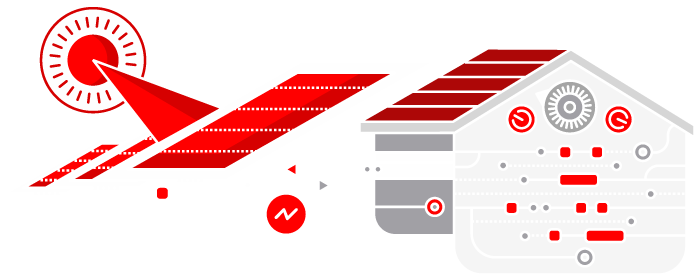FAQ
Frequent Questions
What is renewable energy?
The term ‘renewable energy’ refers to energy that is harvested from natural, non-depletable energy sources. Their are 5 types of renewable energy sources…
Solar: Solar power is energy absorbed from the sun that is converted to usable electricity. The process is known as photovoltaic technology.
Hydro: Hydro power is energy created by water being channeled through turbines to generate electricity.
Wind: Wind Power harness the power of the wind with large turbines which generate electricity.
Geothermal: Geothermal energy is power that is created by utilizing the steam produced when water is pumped onto underground rocks that are naturally heated by the earth’s core.
Biomass: This is power created by utilizing the steam produced by processing waste such as wood, garbage, manure or green waste.
Frequent Questions
What is renewable energy?
The term ‘renewable energy’ refers to energy that is harvested from natural, non-depletable energy sources. Their are 5 types of renewable energy sources…
Solar: Solar power is energy absorbed from the sun that is converted to usable electricity. The process is known as photovoltaic technology.
Hydro: Hydro power is energy created by water being channeled through turbines to generate electricity.
Wind: Wind Power harness the power of the wind with large turbines which generate electricity.
Geothermal: Geothermal energy is power that is created by utilizing the steam produced when water is pumped onto underground rocks that are naturally heated by the earth’s core.
Biomass: This is power created by utilizing the steam produced by processing waste such as wood, garbage, manure or green waste.
Are there currently any incentives for homeowners for solar energy?
Currently North Carolina homeowners are eligible for a 26% tax credit on their investment from the Federal government. These benefits were recently extended until the year 2020
North Carolina Duke Energy and Duke Energy Progress have a cash incentive (60cents per watt) or $600 per kw up to $6000 max
South Carolina is currently offering 26% federal and 25% SC State tax credit. However, This could be the last year for solar rebates in South Carolina.
How do solar panels work?
Solar panels are photovoltaic cells. They are comprised of semiconductor materials such as silicon as well as the elements phosphorous and bornon. These elements create conductivity with the cell which produces movement in the electrons. These electrons, when activated by the sunlight’s energy, move across the cell and into the electrical circuit that is hooked up to the solar panel.
What size solar power system is right for my home?
The size of your solar panel system is dependent upon how much electricity you use in your household. Two similar size houses may need completely different energy needs due to the size of the family and the number of items that need powering. Heaters, Air Conditioners and pools demand a lot of energy. On average, a home solar system is around 5 kW. This should generate nearly all the electricity your home needs.

How do solar panels work?
Solar panels are photovoltaic cells. They are comprised of semiconductor materials such as silicon as well as the elements phosphorous and bornon. These elements create conductivity with the cell which produces movement in the electrons. These electrons, when activated by the sunlight’s energy, move across the cell and into the electrical circuit that is hooked up to the solar panel.
What size solar power system is right for my home?
The size of your solar panel system is dependent upon how much electricity you use in your household. Two similar size houses may need completely different energy needs due to the size of the family and the number of items that need powering. Heaters, Air Conditioners and pools demand a lot of energy. On average, a home solar system is around 5 kW. This should generate nearly all the electricity your home needs.

How much energy can a rooftop solar system produce for me?
There are a lot of factors that go into determining that. Does your home have Southern exposure? If so the panels will work optimally for you. However, even if your home’s alignment isn’t ideal you can still get a lot of benefit from a solar system. With a correctly sized system you will be able to produce as much electricity as necessary for your home.

Do solar panels need to face South?
No. You may get the maximum return with a South facing home. But you can get strong returns if your home faces any other direction, with the exception of North. If your only option is North faced roofing, we do not recommend solar panels.

What Happens if my panels are in the shade?
Trees, chimneys, roof peaks and structures that neighbor your home can all cause shady areas. A small amount of shade will not cause much of an issue, however trees and other objects that obstruct the sun can have a significant impact. If the blocking object is twice as far away as it is higher than the solar panels, you should be good. Any close and it may be a concern.
It is important to take into consideration all times of the day (see above about facing)
Does the roof need to meet any special requirements?
We highly recommend not installing on top of a roof that is in immediate need of repair or replacement. We do partner with roofing companies that can take care of issues for you before we begin, but if it is in bad shape it should be addressed before the panels are installed.
It is important to note that the panels will actually increase the life of your roof by protecting it from the elements.
Will my solar panels work when it is cloudy or raining?
Our panels are most effecting in direct sunlight, however they will work with either indirect or direct sunlight, even when reflected or partially blocked by clouds. Rain does a great job of washing away dirt and grime and keeping your solar panels working at peak efficiency.
How will solar panels affect the price of my home?
At a baseline estimate, for every $1000 saved in energy each year approximately $20,000 is added to a home’s resale value. There are few improvements you can do to your home that will save as much energy as solar panels. Homes with solar panels are currently selling very well.
How Long do solar panels last?
Our solar panels come with a 25 year warranty and performance warranty, but typically have a lifespan of close to 40 years.
Does the roof need to meet any special requirements?
We highly recommend not installing on top of a roof that is in immediate need of repair or replacement. We do partner with roofing companies that can take care of issues for you before we begin, but if it is in bad shape it should be addressed before the panels are installed.
It is important to note that the panels will actually increase the life of your roof by protecting it from the elements.
Will my solar panels work when it is cloudy or raining?
Our panels are most effecting in direct sunlight, however they will work with either indirect or direct sunlight, even when reflected or partially blocked by clouds. Rain does a great job of washing away dirt and grime and keeping your solar panels working at peak efficiency.
How will solar panels affect the price of my home?
At a baseline estimate, for every $1000 saved in energy each year approximately $20,000 is added to a home’s resale value. There are few improvements you can do to your home that will save as much energy as solar panels. Homes with solar panels are currently selling very well.
How Long do solar panels last?
Our solar panels come with a 25 year warranty and performance warranty, but typically have a lifespan of close to 40 years.
Made in America


